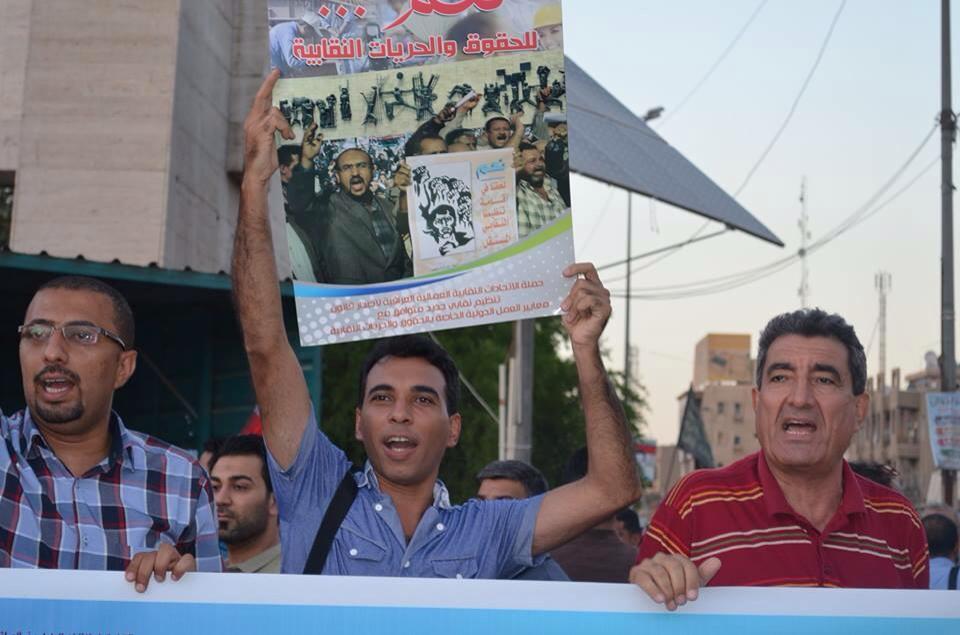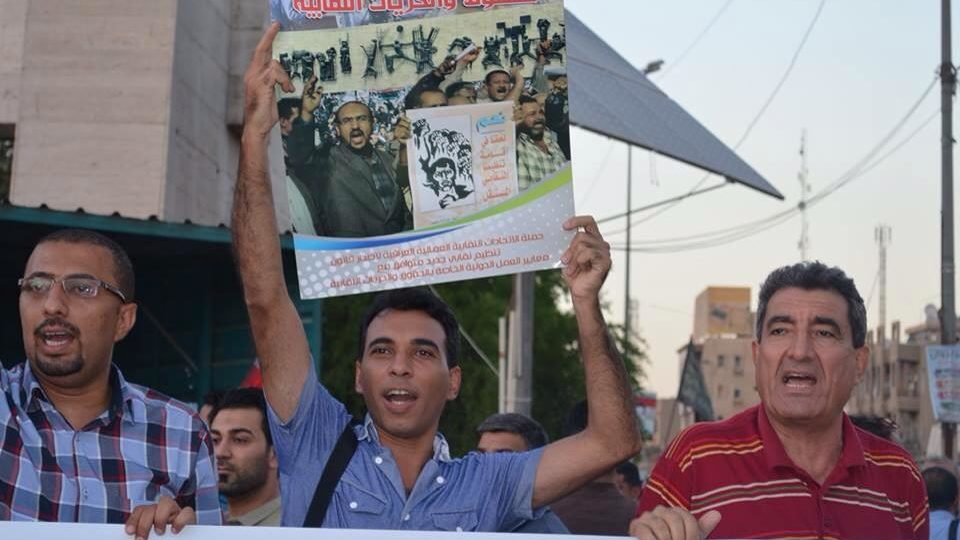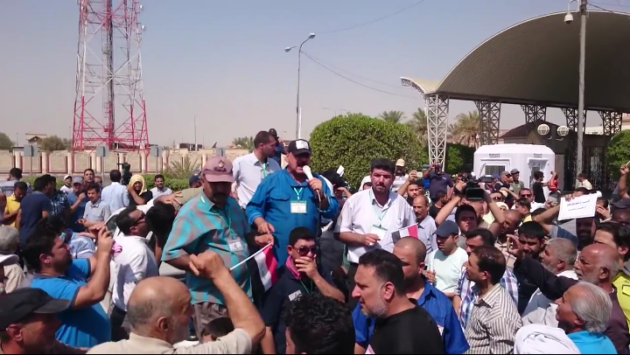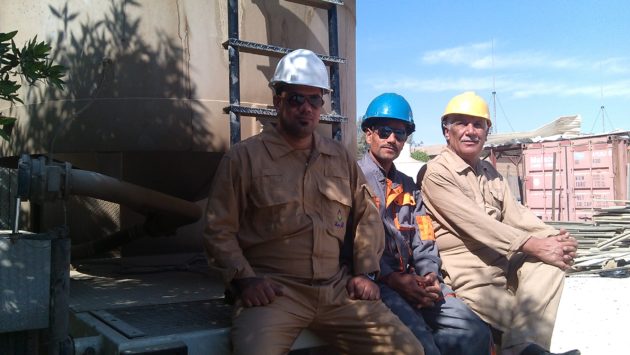Reflections on the Long-Awaited Victory of a Just Iraqi Labor Law
Interview by ICSSI to Wesam Chaseb Ouda (Solidarity Centre) – Baghdad, August 26, 2015

Why do you think this law was finally passed now?
There are many reasons. First of all there were no objections or new comments from any party (from members of the government, workers, or employers) about this law because of the long period of negotiations and discussions among those parties. The unions clarified for the Ministry of Labor and the members of the Labor and Social Affairs Committee the obligations under ILO [International Labour Organization] conventions, which convinced them that only the version of the law the unions supported would be in compliance with international standards. In the process, the unions gained the full support of the Ministry and the Labor Committee for their version of the law. This was absolutely crucial to the vote being scheduled in the parliament and to assuring that the version of the law that would be voted on was the union’s version. Second, pressure from the workers and the unions to pass this law increased over the last few months because there was no longer any legitimate reason to delay it. The unions’ and civil society’s campaign convinced members of parliament of the importance of passing this version of the law at this time, which ensured it received the vote it needed. Third, the labor law 71/1987 has failed to protect workers’ rights or to organize industrial relationships between the involved parties because of the significant weaknesses in the 1987 law and huge, subsequent developments in the labor world. The strong cooperation and unity between the different labor federations in Iraq was also essential to the success of their campaign as was the fact that they were able to gain widespread support for their campaign both from civil society within Iraq, but also internationally. Support from organizations such as the Solidarity Center, IndustriALL, the ITUC, the ILO, US Labor Against the War, and others was crucial to passing this compliant version of a labor law at this time.
How do you feel about this great success?
It feels like a pink dream has come true! When you realize that millions of workers and their families will have an opportunity to improve their lives and their economic and social situations – this is a huge achievement. Moreover, the law recognizes the right of freedom of association for workers, their right to collective bargaining and their right to strike. It also prohibits child labor and gives women workers their full rights and protects them from discrimination in all aspects of work, including hiring, pay, job duties, and promotion, as well as prohibiting any sexual harassment in the workplace. One of the main outcomes of this successful campaign is that it has raised the status of Iraqi unions in society and within certain agencies of the government, which helps them to represent the interests of all workers in Iraq. Other stakeholders now have a much greater appreciation of the role unions can play in addressing social justice issues and in providing a voice for ordinary working people. I am sure this law will reduce the shock of the economical transitions and the costs of the war with ISIS, as well as reducing poverty in Iraq over the next 10 years, if the provisions of this law are fully applied, are monitored by the government (through labor inspections), and are actively followed up on by the trade unions.
What was the role of civil society activists?
In addition to the unions, national and international CSOs played a critical role, as did members of the international labor community – including the ILO, the Solidarity Center and others. The support of CSOs gave a special emphasis to the ways in which the struggle for labor rights goes beyond the unions and is a key element of the much greater struggle for social justice in Iraq. Local and international CSOs did everything to help Iraqi unions in this campaign, especially the Iraqi Civil Society Solidarity Initiative (ICSSI), the Iraqi Social Forum (ISF), and Tamuz organization, but the big changes happened after the participation of Iraqi unions in the ICSSI 2014 Annual Conference held in Oslo. Unions realized they should work with CSOs and open new channels with CSO activists. An ISF representative in Iraq was invited to the trade unions’ Solidarity Center meetings concerning the labor code, and later organized a meeting between the ISF, the unions, the Solidarity Center and several CSOs in Baghdad to discuss the unions’ needs going forward in the labor law campaign. It was important that Iraqi trade unions joined the first season of the Iraqi Social Forum in 2013 and organized a specific activity about the new labor code. This was a very important part of the Iraqi trade union campaign to raise public awareness and win support for their efforts from civil society. The latest collaboration of CSOs with Iraqi unions was just one week before the vote on the labor law took place, during the consultative conference that was conducted between the parliament, MoLSA , unions, and the Solidarity Center to discuss the final amendments to the labor law. That was one of the main success stories in the labor law campaign – the new cooperation between Unions and CSOs that took place and resulted in the victory of this campaign.
What is the impact of the nonviolent demonstrations that are taking place?
Definitely, the latest labor protests in the industrial, transport, electricity, oil, and other sectors helped to raise workers’ voices. In addition to the unions’ participation in the current protests in locations across Iraq, the large protests have made it clear not only how workers’ feel about their current relations with the government, but it has also shown that workers, CSOs, and unions have the ability to organize themselves and to mobilize workers to take coordinated, collective action in defense of their rights. These protests have raised the confidence of the Iraqi labor movement in their ability to take a united stand and oppose the injustice that workers face. Although the former parliament voted on some of the articles of the labor law, they could never finally vote on a complete, final law due to political conflicts in Iraq and to the lack of a quorum of the parliament for several sessions. The new parliament decided to vote on the labor code quickly, but MoLSA presented new amendments that delayed the voting until discussions with the unions and the parliament took place in a consultative conference, held in Baghdad in August 2015. The successful vote took place almost immediately following this conference. Protests in the streets definitely contributed to the sense of urgency to finally pass this new law.
Wesam Chaseb Ouda is the Iraq Program Manager in Solidarity Center, Baghdad.




